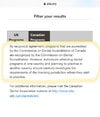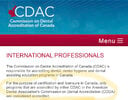- Joined
- Sep 9, 2019
- Messages
- 108
- Reaction score
- 14
Hello I was debating between applying to Canadian and US schools. In particular, I am really interested in going to Dental Schools in Canada. I'm in the US and citizen of US.
I was told it will be unsuccessful venture and will waste money. They say I will end up jobless and then be unable to return back to US as they state the Canadian degree means nothing. Please tell me there is there no truth to their words? Is it possible to get a degree from there and be able to practice easily in Canada? Or will I be able to come back after getting the degree and practice in America? Or will US clinics look down canadian degrees? Also whats the process for residency in Canada. Is it better to specialize in Canada or is US better? Please advise me as this determines where I will apply
Thanks in advance!!!
I was told it will be unsuccessful venture and will waste money. They say I will end up jobless and then be unable to return back to US as they state the Canadian degree means nothing. Please tell me there is there no truth to their words? Is it possible to get a degree from there and be able to practice easily in Canada? Or will I be able to come back after getting the degree and practice in America? Or will US clinics look down canadian degrees? Also whats the process for residency in Canada. Is it better to specialize in Canada or is US better? Please advise me as this determines where I will apply
Thanks in advance!!!


